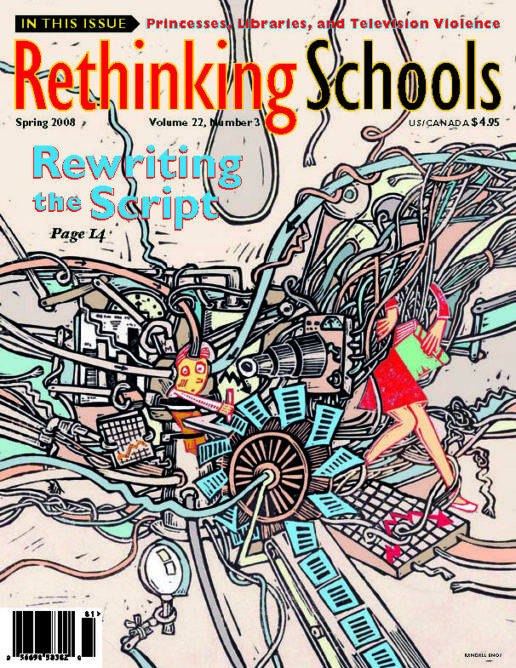Think Less Benchmarks
A flawed test does more harm than good
Illustrator: Jordin Isip

I’m staring at this bulging envelope on my desk. It’s a big envelope, much larger than your typical letter-sized envelope, you know, a big one, one that could fit about 15 test booklets and answer sheets. It was just dropped off by our school’s “literacy coach.” I put quotes around these two words because I often wonder why she was given that title. Much of what she does has nothing to do with literacy. I think we should just call her the “test passer-outer” or something like that, because that is really the bulk of what she does throughout the school year. Positions like these have been hijacked by testing crusaders in schools and districts around the country. Originally, our district adopted these ThinkLink benchmark assessments for schools identified as not making Adequate Yearly Progress (which was disturbing enough: “Our kids are failing, so let’s make them take more tests.”) Then last year I learned that virtually all schools were being forced to participate regardless of AYP status.
ThinkLink tests are designed to mirror the format of our state assessments. According to the district — and to the salespeople at ThinkLink — the ThinkLink “formative” assessments would help our district better predict student performance on our state’s high-stakes exams. These high-stakes tests are aligned with our state’s arbitrary set of standards for each grade level, standards that tend to be incredibly unrealistic and developmentally inappropriate.
There are four benchmark tests a year. Thanks to the folks at the Discovery Channel, that TV channel with the nifty little logo of the earth spinning, my 8-year-old students have four more opportunities to stop learning and fill in the bubbles. The folks at Discovery Education have added an extension to their suite of services. They’ve branched into the assessment market and now produce ThinkLink formative assessments for districts across the country.
According to the catchy little press release from Discovery Education: “Discovery Education acquired ThinkLink Learning in April 2006, expanding the business unit’s high-quality products and services to include formative assessment. ThinkLink pioneered a unique approach to formative assessment that uses a scientifically research-based continuous improvement model that maps diagnostic assessment to state high-stakes tests.” So essentially, it’s an expensive assessment program — our district spent roughly $400,000 on it this year — built on the assumption that repeated testing of children will help them to do better on tests. Forget about reading specialists, art, music, school psychologists, nurses, social workers, or support staff. It’s ThinkLink to the rescue!
This is why the overstuffed envelope has landed on my desk. My first impulse is to chuck it in the trash. I’m sure this is the impulse of any teacher who has actually read these assessments. The first time I saw a ThinkLink benchmark I was shocked and dismayed. It was poorly written (e.g., “There was once a little peasant girl. She was pretty as a star in its season. Her real name was Blanchette. She was called Little Goldenhood because of a wonderful little coat with a hood she always wore.”); riddled with errors (e.g., “I think of my summers on Grandpa’s farm.”); and developmentally inappropriate (e.g., “Reread the title of the story: The Armadillo: A Shelled Mammal. What happens when –ed is added to the word shell in the title?
A. it becomes a word that tells when the mammal was shelled
B. it becomes a word that tells how armadillos move
C. it becomes a word that describes the word mammal
D. it becomes a word that is the present tense of the verb shell”).
It was all completely disconnected from the curriculum I was teaching.
I decided to call our district’s director of assessment in December 2006, after our first round of benchmarks, to ask about them. It amazed me that this program was implemented so quickly. After all, hadn’t Discovery Ed. Inc. just rolled out this new suite of assessments in April 2006? Teachers in the district were never asked if we wanted to use such testing in our classrooms, the tests were just bought and then mandated, without any discussion. I was upset because my 3rd graders had just finished the weeklong state assessment in November (and all of the preparation preceding), and then we had to stop reading Charlotte’s Web for two days, and instead fill in more bubbles. The phone conversation was interesting.
According to the assessment director, teachers around the district loved the ThinkLink assessments. She said that I was the only one who complained, and that teachers were amazed at the quick return of test results and data. She said that teachers told her they were learning so much about their students and their learning from these assessments. I was surprised by this response. I had just spoken to a teacher at another elementary school who told me that the entire staff had written a letter protesting the district-wide adoption of these additional tests. The assessment director even claimed that some principals were requesting benchmark assessments for their 1st- and 2nd-grade classrooms (in our district these tests start at 3rd grade and move up all the way through 9th grade, no classroom is left unscathed, except kindergarten, 1st and 2nd grades — which may very well change if this madness continues.) I could not believe what I was hearing.
The benchmark testing questions were all over the place. Most of them were not at all related to what I was teaching in the classroom. For example, after reading a confusing passage about edible insects — in which there was no explanation of what “edible” means, nor any obvious context clues to help children figure out the meaning of “edible” — my students were asked:
“Which of the following is nearly the opposite of edible?
A. antiedible
B. preedible
C. anedible
D. inedible.”
Is this not insane?
I teach about prefixes and suffixes in my classroom, but come on, people. The questioning is so convoluted. My students are 8-year-olds who just started reading two years ago. I want my children to become independent learners and lovers of books. These tests make reading seem awful and tedious. An equally upsetting question asks children to identify an author’s purpose (one of our 3rd grade reading “standards” in Wisconsin). My 3rd graders are often asked if a passage was written to entertain, persuade, or inform. Much of what we read in our lives does all of these. We recently finished reading Turtle Bay. It’s a story about friends cleaning a beach so sea turtles will come and lay their eggs. The story was definitely entertaining, it persuaded my students to think about their actions (e.g., littering hurts animals), and we were informed about turtles. So, in the name of “standards,” my students are expected to answer these horribly misleading questions. Why has reading been reduced to this?
At the end of our conversation, the director of assessment asked me if I wanted to participate in making the tests better. I agreed to go over the initial assessment, highlighting grammatical errors and misplaced questions. I sent the offending booklet to her office with red marks and comments. I was then asked if I would be interested in going over future ThinkLink assessments, and at the time, I agreed. But then I began to think about it. I was never asked my opinion about these assessments in the first place, and now here I was agreeing to spend my valuable time working to make these lame assessments better? These tests were mandated in our district without critical discussion and questioning. I was also told that the district would survey teachers about these assessments at the end of the school year. I have yet to see a survey.
Needless to say, I did not spend more of my time working to improve the flawed benchmarks. I have, instead, decided to advocate for my students and their learning. I have been sending opinion pieces to local newspapers and magazines. I have testified at school board meetings. I stand up at staff meetings (often alone), and express my concerns. I will not be apathetic. I’m not buying into this random adoption of mandated assessments. I am tired of this antichild, for-profit agenda in our schools and classrooms. Teachers must come together and speak out against the foolishness and absurdity of it all. Our students deserve more than this. The huge sums paid to Discovery Education, Inc. could be put to much better use.
So here I sit, staring at the envelope full of ThinkLink tests. The envelope conjures up conflict within me. I don’t want to subject my students to this nonsense. I want to resist. I want to shred each booklet page by page, especially the top page with the cute little earth logo. But I can’t. I have to pass out these tests or risk my job. Tomorrow, when I pass out the booklets and scantron sheets, I’ll explain to my students that some of the questions were confusing even to me, their teacher. I’ll ask them not to worry. I’ll ask them to do their best. NCLB puts pressure on districts to gather more data, and testing companies get richer producing tests which guarantee large amounts of failure, thus ensuring future customers. It’s a vicious, mean-spirited cycle. The way we educate our children is being driven by these test scores. We spend hours at staff meetings looking at the “data” gathered from these mass produced assessments instead of sharing ideas about meaningful learning and what really works in the classroom.
Who needs the arts? Screw recess. Let them eat tests. I’ll think about this tomorrow as my 3rd graders fill in perfect little circles on their benchmark score sheets — 3rd graders, who are most definitely being left behind.

